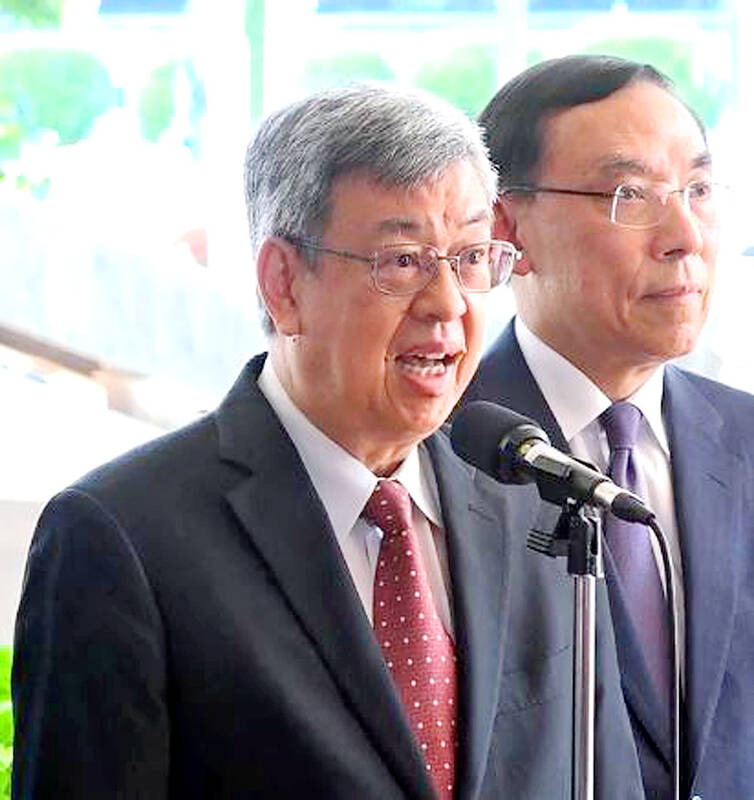The global trend is toward “de-risking” relations with China, Premier Chen Chien-jen (陳建仁) said yesterday, in response to calls by opposition parties to restart talks on a proposed cross-strait service trade agreement.
Previous talks on the proposed pact resulted in “several hundred thousand Taiwanese standing up in protest,” Chen said, referring to the Sunflower movement of 2014.
Today, Taiwan hopes to follow the global trend of de-risking with China, and “not putting all of its eggs in one basket,” he said.

Photo: Screenshot from Liberty Times’ YouTube
De-risking is especially important for Taiwan given US-China tensions, and Taiwan’s desire to boost economic cooperation with other countries, Chen said.
Chen made the remarks after Taiwan People’s Party Chairman Ko Wen-je (柯文哲), who is running for president, raised the proposal at a recent event. New Taipei City Mayor Hou You-yi (侯友宜), who is the Chinese Nationalist Party’s (KMT) candidate, has also expressed support for the proposal.
The proposed agreement, which China and the then-KMT government signed in 2013, aimed to liberalize trade and investment rules between the two economies in service industries including finance, tourism, healthcare, telecoms and publishing.
However, the KMT’s efforts to hastily ratify the pact in the legislature set off a three-week, student-led sit-in protest in the legislature, which led to the agreement being shelved.
Economic Democracy Union convener Lai Chung-chiang (賴中強) said that if the proposed pact were approved, large numbers of Chinese companies would establish local branches in Taiwan, which would likely hire Chinese employees, and would not help local employment.
The goal of any such trade or service agreement would be the complete integration of Taiwan’s economy with China’s, he said.
Chinese agricultural and industrial products would also be dumped on Taiwan, which would greatly harm Taiwanese farmers and manufacturing firms, he said.
“The result of economic integration would be to bring the economic risks of China closer to Taiwan, while forcing Taiwan to remain on its old path of economic dependence on China,” he said.
Vice President William Lai (賴清德), who is the Democratic Progressive Party’s presidential candidate, on Sunday said that those proposing to restart talks on the service trade pact “do not understand current international trends.”
“Taiwan’s current economic and industrial structure is completely different from what it was when the agreement was first discussed 10 years ago,” he said. “To enter into such an agreement today would be very detrimental to Taiwan.”
Asked about the pact, Hou on Sunday said that “both sides of the Taiwan Strait should resume pragmatic exchanges and dialogue on cooperation in education, culture, and in trade and the economy, including through the cross-strait service trade agreement.”
During a radio interview yesterday, Ko said that talks on the agreement should be preceded by supervisory regulations, and that “the trade in goods must precede the trade in services,” because the former would present “fewer problems involving people, and is therefore easier to deal with.”
Additional reporting by Tang Shih-ming, Huang Tzu-yang and CNA

SECURITY: As China is ‘reshaping’ Hong Kong’s population, Taiwan must raise the eligibility threshold for applications from Hong Kongers, Chiu Chui-cheng said When Hong Kong and Macau citizens apply for residency in Taiwan, it would be under a new category that includes a “national security observation period,” Mainland Affairs Council (MAC) Minister Chiu Chui-cheng (邱垂正) said yesterday. President William Lai (賴清德) on March 13 announced 17 strategies to counter China’s aggression toward Taiwan, including incorporating national security considerations into the review process for residency applications from Hong Kong and Macau citizens. The situation in Hong Kong is constantly changing, Chiu said to media yesterday on the sidelines of the Taipei Technology Run hosted by the Taipei Neihu Technology Park Development Association. With

CARROT AND STICK: While unrelenting in its military threats, China attracted nearly 40,000 Taiwanese to over 400 business events last year Nearly 40,000 Taiwanese last year joined industry events in China, such as conferences and trade fairs, supported by the Chinese government, a study showed yesterday, as Beijing ramps up a charm offensive toward Taipei alongside military pressure. China has long taken a carrot-and-stick approach to Taiwan, threatening it with the prospect of military action while reaching out to those it believes are amenable to Beijing’s point of view. Taiwanese security officials are wary of what they see as Beijing’s influence campaigns to sway public opinion after Taipei and Beijing gradually resumed travel links halted by the COVID-19 pandemic, but the scale of

A US Marine Corps regiment equipped with Naval Strike Missiles (NSM) is set to participate in the upcoming Balikatan 25 exercise in the Luzon Strait, marking the system’s first-ever deployment in the Philippines. US and Philippine officials have separately confirmed that the Navy Marine Expeditionary Ship Interdiction System (NMESIS) — the mobile launch platform for the Naval Strike Missile — would take part in the joint exercise. The missiles are being deployed to “a strategic first island chain chokepoint” in the waters between Taiwan proper and the Philippines, US-based Naval News reported. “The Luzon Strait and Bashi Channel represent a critical access

Pope Francis is be laid to rest on Saturday after lying in state for three days in St Peter’s Basilica, where the faithful are expected to flock to pay their respects to history’s first Latin American pontiff. The cardinals met yesterday in the Vatican’s synod hall to chart the next steps before a conclave begins to choose Francis’ successor, as condolences poured in from around the world. According to current norms, the conclave must begin between May 5 and 10. The cardinals set the funeral for Saturday at 10am in St Peter’s Square, to be celebrated by the dean of the College